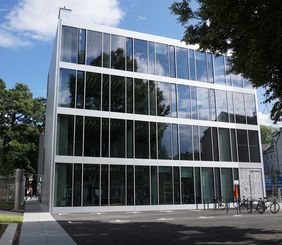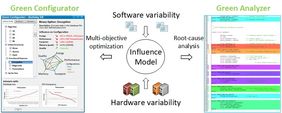
Research project "Green Configuration" aims to reduce the energy consumption of complex IT systems
As of February 2018, the German Research Foundation (DFG) will be funding the research project »Green Configuration« of Prof. Dr. Norbert Siegmund, Professor of Intelligent Software Systems at Bauhaus-Universität Weimar, for a period of three years with 590,000 euros. The research project aims to reduce the energy consumption of complex IT systems.
Nowadays, users can independently assemble their software and hardware components. However, they often lack the knowledge of how the individual components interact. The consequence: the energy consumption of our IT systems is constantly rising. »By 2020, it will probably have doubled,« Professor Siegmund of the Department of Computer Science and Media warns.
In order to reduce the energy consumption of IT systems long term, the media computer scientist and his team are developing approaches in the project »Green Configuration« to identify the interaction of various hardware and software components, and to improve it with regard to their energy efficiency. »In this project, we seek to develop technologies with which we can measure, predict and optimise the influence of individual features and their effects on energy consumption. By raising awareness about the fact that configuration decisions have a significant effect on energy consumption, we can potentially save larger amounts of energy than with software-based optimisations,« says Prof. Dr. Siegmund.
The core of the project consists of a model that describes the effects on energy consumption caused by features of software and hardware systems as well as the workload being processed. The influence of these features is determined using software analyses and modern machine learning techniques. Input from special sampling procedures and the results of control and data-flow analyses are combined in order to discern optimal configurations while attempting to determine the causes for energy problems. The influential model provides the data for the »Green Configurator« - a software that makes users aware of the effects that configuration options have on energy consumption and other features such as performance.
The second part of the project focuses on the development of methods and analyses that are designed to help the developers of software systems identify and visualise parts of the code that have a high level of energy consumption. The goal is then that the code can be optimized in a targeted way to lower energy consumption.
Bauhaus-Universität Weimar
Professorship for Intelligent Software Systems Prof. Dr. Norbert Siegmund
Bauhausstraße 9a
99423 Weimar
Tel.-no.: 03643 /58 35 74
Email: norbert.siegmund[at]uni-weimar.de
Web: www.uni-weimar.de/de/medien/professuren/medieninformatik/intelligentesoftwaresysteme/
Kontakt
Bauhaus-Universität Weimar
Claudia Weinreich
Pressesprecherin
Tel.: +49(0)3643/58 11 73
Luise Ziegler
Mitarbeiterin Medienarbeit
Tel.: +49(0)3643/58 11 80
Fax: +49(0)3643/58 11 72
E-Mail: presse[at]uni-weimar.de
Web: www.uni-weimar.de/medienservice

